[ad_1]
Call to Save Creation Show Sponsored by Alicia Keys, Camila CabelloColdplay, DrakeFuture, J. Cole, Jack HarlowJohn Legend, Lil Baby, Mary J. Bligesimple mill, Megan Thee StallionPost Malone, Roddy Rich, Travis Scottand others;
Companies include Warner Music Group, Universal Music Group, Sony Music Group, BMG, Kobalt, AEG Presents, Audiomack, Deezer, Live Nation Entertainment, SiriusXM, SoundCloud, Spotify, TIDAL, TikTok, and YouTube Music;
Organizations such as A2IM, American Civil Liberties Union, Color Of Change, PEN America, Recording Academy, and RIAA; The experts Columbia, Harvard, Howard, Princeton, Stanforda Yale
Ad Running Today in The New York Times and the Atlanta Journal-Constitution
Read the full letter HERE
NEW YORK, November 1, 2022 /PRNewswire/ — Artists, industry leaders, and legal experts have joined together in a call to “Save Black Art,” publishing an open letter to The New York Times a The Atlanta Journal-Constitution prompting lawmakers across the United States to limit how creative language can be used against defendants at trial. Basically, we need to stop using racism to make rap lyrics a confession.

It’s in a long list of diverse signatures company such as Warner Music Group, Sony Music Group, Universal Music Group, BMG, Kobalt, and Atlanta-based LVRN and Quality Control, AEG Presents, Audiomack, Deezer, Live Nation Entertainment, SiriusXM, SoundCloud, Spotify, TIDAL, TikTok, and YouTube Music; administration Such as the American Association of Independent Music, the American Civil Liberties Union, Artist Rights Alliance, Black Music Action Coalition, Black Women’s Roundtable, BLD PWR, Color Of Change, Foundation for Individual Rights and Expression, NYU Center on Received, Renequality, and Law, People for America, PEN America, Rap Coalition, the Recording Academy, the Recording Industry Association of America, Red Hot, Sankofa.org, Music a North AmericaSony Music Group’s Social Justice Fund, Warner Music Group / the Blavatnik Family Foundation’s Social Justice Fund, Voting Woke, and International Music for Change; jurists and humanists from leading universities including Columbia, Harvard, Howard, Princeton, Stanforda Yale; a artists and composers like 2 Chainz, 21 Savage, 50 centsHe Boogie Wit da Hoodie, Alicia Keys, Amy Allen, Baby Tate, Benson BooneBig Sean, Black Eyed Peas, Breland, Brothers Osborne, Bryce Vine, Busta Rhymes, Camila Cabello, Christina AguileraColdplay, Cordae, D-Nice, East DaveDJ Play, DJ Khaled, Drake, Erika Bankfat joe Fred BangFuture, Giveon, mokopuna, Tino Manawao, Hit-Boy, Ice-T, IDK, Isaiah RashadJ. Cole, Jack HarlowJadakiss, Jay Electronica, Jeezy, Joey Bada$$, John Legend, KayCyy, Killer Mike, Lainey WilsonLil Baby, Lil Jairmy, Lil Tjay, Lil Uzi Vert, Mac Phipps, Mary J. Bligesimple mill, Megan Thee Stallion, Michelle BranchMiguel, Moneybagg Yo, Morgan WallenNAV, Nessa BarrettNLE Choppa, Normani, Omar ApolloPheelz, Polo G, Post Malone, Quavo, Questlove, Regina Spektor, Robin ThickeRoddy Ricch, Shordie Shordie, Shy Carter, TI, Takeoff, Tanna Leone, Teddy bearTee Grizzley, Theo Crocker, Travis Scott, Ty Taara $ign, WILLOW, YBN Nahmir, and Yo Gotti.
Written and published by Warner Music Group (WMG), the letter includes in part:
In addition to disregarding the free speech and creative expression protected by the First Amendment, this civil action punishes segregated communities and their discourses on family, war, life and win
Kevin LilesChairman and CEO of WMG’s 300 Elektra Entertainment, said: “For decades, a racial double-standard has been applied to Black and Brown hip-hop artists by turning their creative vision against them in the courts of law. Enough. If prosecutors are not willing to stop this practice on their own, then laws must be passed to stop this abuse. On behalf of WMG, I want to thank the incredible group of people across our industry and the legal community who are joining us in this important fight.”
Julie GreenwaldChairman and CEO of WMG’s Atlantic Music Group, said: “Throughout history, artists have created characters and stories that reflect the culture around them. The reality is Black art is threatened at an unprecedented level, and we must work hard to stop this irrational, discriminatory approach to justice.”
Experts have found more than 500 rap-related cases as evidence in public records, and they see this number as just the tip of the iceberg. Generally, this does not take into account jury trials, juvenile cases, or cases that end in a plea, and plea bargains are the most common outcome in criminal trials. At the time, researchers found only four instances since the 1950s of non-rap songs being offered as evidence – three of those cases were thrown out, and the fourth was overturned. after the trial.
Lawmakers at the state and federal levels are already taking action. Governor Newsom signed a bill into law Californiaand a bill is currently being considered in New York a New Jerseyand the RAP (Restoring Artistic Protection) Act introduced by Rep. Hank Johnson and Rep. Jamal Bowman in the US Congress.
The #ProtectBlackArt movement began earlier this year when Liles and Greenwald launched a change.org petition, which today has nearly 65,000 signatures.
Download it here.
Media contact
For Warner Music Group
James Twins
[email protected]
Majeda Hussein
[email protected]
ISSUE Warner Music Group Corp.

[ad_2]
Source link
